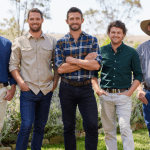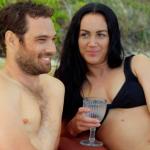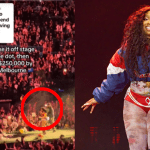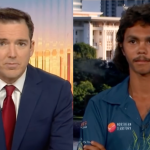
Tyondai Braxton and his girlfriend are drinking in a New York City bar when I call him. Clinking glass and hushed voices gurgle in the background and I half expect his smooth tenor to morph into a chipmunk squeal. It never does. Over the course of our conversation, Braxton, a well-spoken and highly intelligent student of music, discusses his relationship with seminal electronic label Warp Records, playing at the Sydney Opera House, his solo album “Central Market” and the rigors of fronting the World’s first crossover math band.
P: Hey Tyondai! What have you been up to today?
T: You’re my first interview and I’m in the middle of the city so it’s a little noisy. I just had practice with my band, Battles.
P: What’s a typical practice session like for Battles?
T: We practice Monday through Friday, 11am till 5 or 6pm.
P: And are you guys writing songs at the moment?
T: Oh yeah. We’re feverishly trying to get some stuff written, it takes us a very long time. We’re in the middle of it now but we’re getting there – slowly but surely.
P: What kind of vibe is it so far? What kind of sounds are you exploring?
T: I’m going to say no comment because we’re still writing. Plus we wanna surprise people!
P: As far as the song writing process goes, how does it happen? Is it a really democratic process, or do you all go in there with strong ideas?
T: No it’s very, very democratic. There are definitely four cooks in the kitchen, as far as the writing process is concerned, which have our own ways of working- it’s a collaborative effort.
P: You’re all extremely talented musically and obviously have strong ideas. Is it hard to put the puzzle together with so many strong musicians in the one band? Or does it make it easier?
T: It is hard sometimes, you know, as you said – everyone in the band didn’t just start playing music last week so everyone kind of has their own ways of working and their own methods so yeah, it’s a little reason why it’s a slow process. In a way the strength of the individual really comes through in the music.
P: Lets talk about †Central Market’ – obviously you’re used to writing and collaborating with other people but on †Central Market’ it’s all internalized. How is the song writing process for you?
T: Well I was writing by myself before the band so it’s good to kind of come back to that, and also take what I’ve learned over the years in collaboration and flesh out my music and approach music that I’ve always loved during my life. It’s a very necessary step for me, I don’t want to just collaborate with people and I also don’t want to just write alone. I think it’s a healthy balance to have both.
P: Was it refreshing to re-visit that mind set of writing stuff by yourself?
T: Yeah, it was more than refreshing. It’s something that I feel like I need to do. It really is the most gratifying part in my life, besides being around family. It’s really one of the most important things, if not the most important thing I do in my life.
P: Was it all new songs for the record or did you revisit songs that you had written prior?
T: Yeah the last two songs on the record are actually older songs and I wanted to incorporate them just to kind of honor the people I used to work in conjunction with…I just wanted to fit in some of my old ways so I tried to find a way to fuse the two together.
P: You kind of alluded to it there but what’s the main thing that’s changed about the way you write music solo – before Battles and after Battles?
T: Well I worked in a very insular manner before. I worked with loops and I did the music by myself and I tried to stretch that method and technique out as far as I could within the way that I was using the tools and after a while you kind of go as far as you can go. I have always been excited about, even within the films, it’s always been the simulation of a lot of people playing and I’ve always been obsessed with large groups of orchestras and large bands and this is an opportunity to use what I’ve learned from my previous experiments- we’re kind of going for the next level. As drastic as it seems its actually very natural.
P: Have you always been a lover of that kind of music? What kind of music did you listen to growing up?
T: I have always been surrounded by classical music and jazz and such growing up but no, the music that I really took to when I was coming of age was rock music, hip-hop, pop- just like the rest of us, you know? But as I got older I started to feel this kind of clinging towards my past and I suddenly realised that I really wanted to do music that was more elaborate and kind of create a world out of sound- my interests really leaned in that direction. So I’m not abandoning my roots, merely incorporating them into a larger framework that interests me at this point in my life.
P: It would seem as well that a lot of fans, of Battles at least, would listen to this record and it would make that kind of music palatable to them. Is that something that you intended?
T: Was it my intention to transition Battles fans into this kind of music, is that what you’re saying?
P: Yeah or just expose people that wouldn’t normally listen to that kind of music to it…
T: Yeah I was conscious of that in the sense that it was kind of more of a by-product of my interests. Like I really wanted to make this music but at the same time I definitely asked myself well, fans of the band are usually people that are up to the challenge as far as listening to new music and keeping an open mind and maybe if they imagine this music, people might start to take another look at the relevance, for instance, of classical music and more challenging music. I think Battles fans are up for the challenge, so I’m hoping that people will be able to see parallels in that music that has traditionally seemed so irrelevant at this point, but I’m here to say its not only relevant but it’s also some of the most exciting music out there at this point.
P: Do you plan to do †Central Market’ live? How are you going to transition it to a live environment?
T: At this point schedule wise, I’m trying to get this Battles record done with these guys and then early next year I’m hoping to do some performances. There’s talk of it right now so I’m kind of setting it up as we speak. Once I get that together, you guys will be the first to know. I’ll use my Facebook or something and everyone will hopefully hear about it when I’m ready.
P: Are you going to do the orchestration live or is it going to be something that you’ll trigger?
T: No, no, no we’ll have to do it live.
P: Yeah cool. Speaking of orchestration, you played in possibly the most famous opera house in the world, in Sydney, how was that? Was that a bit surreal playing there?
T: That was one of the most amazing places I’ve ever played. Obviously. And on a personal note it was one of the most amazing moments of my life, to have an opportunity to play there. I was very honored to play at the Sydney Opera House – it’s kind of the equivalent of to coming to New York and playing under the Statue of Liberty. It’s one of the most iconic things, not only in Australia but the world. It’s a very iconic building so it was a real honor and a really special time to be able to perform there.
P: I was just interested, Brian Eno was the curator that festival – did he get in touch with you guys personally?
T: Yes, he did. We met him in London a couple of years ago and he’s a really awesome guy. It’s an honor to work with him in any capacity. We’re all huge fans of his music.
P: Tell us about Warp records. Obviously it’s one of the most critically acclaimed labels in the world – what’s it like to be in that family?
T: It’s unreal, I mean, it’s a label that I have grown up listening to and to get a chance to work with these guys is unbelievable. It’s as amazing as you could possibly get because not only are they this critically interesting label but even the way that they work is so awesome and they’re a really amazing company. We’re very luck to be working with them, I’m very lucky to be working with them as well.
P: Were you surprise at †Mirroed’s success?
T: Yeah! You’re always surprised when someone says they like what you do. On the other hand- you believe in what you do and hope that people can hear what you hear in what you’re doing so I’m very happy that people are responding.
P: There’s always that idea of the sophomore slump after a really strong, critically acclaimed first album comes out. Do you worry about that at all?
T: Not at all because critics will do what they want to do no matter what the situation is. As I get older I start to realise that the critical relevance as far as my own life and as far as my own perception of the music is irrelevant. Someone is always going to have something bad to say or something good to say and it kind of doesn’t matter. The way I look at it is- as long as I love the music, that’s all that matters.
P: Yeah. Just quickly – what can we expect from Battles in the future? When is the album slated for release?
T: Sometime the next year the record will be finished. It’ll be out next year.
P: Well thanks for your time mate and looking forward to seeing you when you’re out in Australia next.
T: Looking forward to it too!
Out now on Warp through Inertia.



